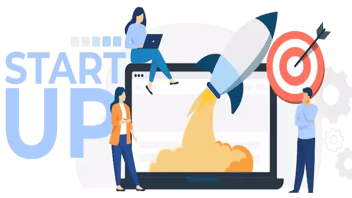9 Business Development Skills You (And Your Business) Need to Succeed
Business Development Skills: Success in business development hinges on a combination of talent, strategy, and execution, and some possess natural aptitude.
However, relying solely on innate abilities isn't enough, considering the competitive nature of businesses today.
Mastering top business development skills is the key to unlocking consistent achievement and propelling your career forward.
So, what exactly are these essential business development skills that separate thriving businesses from those struggling to stay afloat? Let's dive into the nine skills that every business development professional should cultivate to maximize their impact and contribute to the overall success of their organization. These skills aren't just theoretical concepts; they are practical tools that, when honed and applied effectively, can unlock significant growth opportunities.
Top 9 Critical Business Development Skills
1. Communication Skills
Communication skills are the bedrock of successful business development. They're the tools that allow you to connect with potential clients, partners, and stakeholders, build rapport, and convey your message effectively. Without strong communication skills, even the most innovative ideas can get lost in translation.
Effective communication takes many forms:
-
Verbal communication: This is the ability to express yourself clearly and confidently in conversations, presentations, and pitches. Imagine a business developer delivering a captivating presentation about a new product, engaging the audience with their enthusiasm and knowledge. That's verbal communication in action.
-
Written communication: Emails, proposals, reports – they all need to be clear, concise, and persuasive. A well-crafted email proposal that anticipates a client's needs and offers compelling solutions can be just as effective as a face-to-face meeting.
-
Non-verbal communication: Your body language, facial expressions, and tone of voice all contribute to the message you're sending. Active listening is a crucial part of non-verbal communication – it shows you're genuinely engaged and interested in what others have to say.
Developing strong communication skills is an ongoing journey. Consider joining a public speaking group like Toastmasters to hone your verbal communication or taking a business writing course to polish your written skills. The more you practice, the more confident and effective you'll become.
2. Negotiation Skills
Negotiation is the art of finding common ground and reaching agreements that satisfy everyone involved. It's a crucial skill in business development, where you're constantly striving to create win-win situations. Whether you're closing a deal with a new client, forming a strategic partnership, or resolving a conflict, strong negotiation skills are essential for success.
Mastering negotiation involves several key elements:
-
Preparation: Before any negotiation, do your homework. Research the other party, understand their needs and priorities, and clearly define your own objectives. Knowing what you want and what you're willing to concede is crucial for a successful outcome.
-
Active listening: Pay close attention to what the other party is saying, both verbally and non-verbally. Ask clarifying questions to ensure you understand their perspective. Active listening helps build trust and identify potential areas of agreement.
-
Compromise: Rarely does a negotiation end with one party getting everything they want. Be willing to compromise and find creative solutions that address the needs of all parties involved. A collaborative approach leads to stronger, more sustainable agreements.
Imagine a business developer negotiating a contract with a new supplier. They've researched the supplier's pricing and capabilities, and they go into the negotiation with a clear understanding of their company's needs. Through active listening, they uncover the supplier's concerns about long-term commitment. The result? A contract that secures a slightly higher price for the company in exchange for a guaranteed multi-year partnership, benefiting both sides.
To sharpen your negotiation skills, consider practicing with colleagues by role-playing different scenarios. You can also take a negotiation course to learn proven tactics and strategies from experts.
3. Networking Skills
Networking is more than just exchanging business cards and superficial pleasantries. It's about building genuine, mutually beneficial relationships with people who can help you grow professionally. Think of it as building a support system of colleagues, mentors, and potential clients who can open doors to new opportunities and provide valuable insights throughout your career.
Effective networking involves a multi-faceted approach:
-
Attending industry events: Conferences, trade shows, and seminars are prime opportunities to connect with people in your field. Do your research beforehand to identify key individuals you'd like to meet. During the event, focus on having meaningful conversations that go beyond small talk.
-
Online networking: Platforms like LinkedIn provide powerful tools for expanding your network. Create a strong profile that highlights your expertise, and engage with others by sharing insightful content and participating in discussions.
-
Follow-up: The real magic of networking happens after the initial meeting. Send a personalized email or LinkedIn message to the people you connected with, referencing something specific from your conversation. This shows you're genuinely interested in building a relationship.
To become a master networker, put yourself out there. Attend industry events, engage in online communities, and don't hesitate to reach out to people you admire. The more you practice, the more natural and rewarding networking will become.
4. Strategic Thinking
Strategic thinking is the ability to see the big picture, anticipate future trends, and make decisions that align with your long-term goals. It's about understanding where your business stands today, where you want it to be tomorrow, and how you're going to get there. In the fast-paced world of business development, strategic thinking is essential for navigating challenges and capitalizing on opportunities.
Effective strategic thinking involves:
-
Market analysis: Thoroughly research your target market, including customer needs, preferences, and buying behaviors. Identify emerging trends and anticipate how they might impact your business.
-
Competitive analysis: Know your competitors inside and out. What are their strengths and weaknesses? How do they differentiate themselves? Use this knowledge to refine your own strategies and stay ahead of the curve.
-
Goal setting: Establish clear, measurable, and achievable goals that align with your overall business objectives. Break down these goals into smaller, more manageable steps, and track your progress along the way.
To enhance your strategic thinking skills, immerse yourself in the world of business strategy. Read books and articles by industry thought leaders, attend workshops and conferences and engage in discussions with colleagues and mentors. The more you cultivate your strategic thinking abilities, the better equipped you'll be to navigate the complexities of the business world and achieve lasting success.
5. Problem-Solving Skills
Challenges are inevitable in business development. Roadblocks appear, deals fall through, and unexpected obstacles threaten to derail your progress. That's where problem-solving skills come in. They're the tools you use to navigate these challenges, find creative solutions, and keep your business moving forward.
Effective problem-solving involves a systematic approach:
-
Identify the problem: Clearly define the challenge you're facing. What are the specific symptoms? What are the potential consequences if left unresolved?
-
Analyze the causes: Dig deeper to understand the root causes of the problem. Is it a lack of resources? A communication breakdown? A shift in the market?
-
Develop solutions: Brainstorm a range of potential solutions, considering their feasibility and potential impact. Evaluate the pros and cons of each option before making a decision.
Imagine a business developer working with a client who's struggling to reach a new target audience. By carefully analyzing the client's current marketing strategy and conducting thorough market research, the developer identifies a lack of engagement with younger demographics on social media. They propose a solution that involves creating targeted social media campaigns with engaging content tailored to the interests of this younger audience. The result? Increased brand awareness, a wider customer base, and a strengthened client relationship.
To hone your problem-solving skills, actively seek out challenges. Embrace complex projects, volunteer for assignments outside your comfort zone, and analyze past successes and failures to identify areas for improvement. The more you practice, the more confident you'll become in your ability to tackle any obstacle that comes your way.
6. Relationship Building
Relationship building is the foundation of long-term success in business development. It's about cultivating genuine connections with clients, partners, and colleagues based on trust, empathy, and mutual respect. These relationships aren't just transactional; they're built on a foundation of shared values and a commitment to mutual success. Strong relationships lead to repeat business, loyal customers, and valuable referrals.
Key strategies for building strong relationships include:
-
Trust: Be reliable, transparent, and consistent in your interactions. Follow through on your commitments and maintain confidentiality. Trust is the cornerstone of any strong relationship.
-
Empathy: Put yourself in the other person's shoes. Understand their perspective, acknowledge their feelings, and demonstrate genuine concern for their needs. Empathy builds rapport and fosters deeper connections.
-
Communication: Maintain open and honest communication. Actively listen, ask questions, and provide timely and relevant information. Regular communication keeps the relationship strong and ensures everyone is on the same page.
To improve your relationship-building skills, focus on genuine connections. Show a sincere interest in others, actively listen to their needs, and be a reliable and supportive partner. Remember, building strong relationships takes time and effort, but the rewards are well worth the investment.
7. Sales Skills
Sales skills are the driving force behind revenue generation. They're the abilities that allow you to effectively present your products or services, persuade potential clients of their value, and ultimately close deals. Whether you're a seasoned sales professional or just starting out, honing your sales skills is essential for achieving success in business development.
Effective selling involves several key elements:
-
Product knowledge: Become an expert on what you're selling. Understand its features, benefits, and how it addresses customer needs. The more you know, the more confident you'll be in presenting your offerings.
-
Understanding customer needs: Take the time to truly understand your potential client's challenges and goals. Ask questions, listen carefully, and tailor your pitch to demonstrate how your product or service can provide solutions.
-
Closing techniques: Mastering the art of closing the deal is crucial. This involves recognizing buying signals, addressing objections, and confidently guiding the client toward a decision.
To improve your sales skills, consider taking a sales training course or workshop. Practice your pitch, refine your closing techniques, and learn from experienced sales professionals. The more you hone your skills, the more successful you'll be in generating revenue and driving business growth.
8. Adaptability and Learning
The business world is a whirlwind of constant change. New technologies emerge, customer preferences shift, and market dynamics evolve at lightning speed. To thrive in this environment, adaptability and continuous learning are no longer optional—they're essential survival skills. Business development professionals who embrace change and actively seek out new knowledge are the ones who stay ahead of the curve and achieve lasting success.
Staying relevant in the ever-changing business landscape requires the following:
-
Keeping up with industry trends: Subscribe to industry publications, attend conferences, and follow thought leaders to stay informed about the latest developments and best practices.
-
Embracing new technologies: Be open to adopting new tools and technologies that can enhance your productivity, improve your communication, and give you a competitive edge.
-
Continuous learning: Never stop learning. Seek out opportunities to expand your knowledge and skills through online courses, workshops, and professional development programs.
To cultivate adaptability and a commitment to continuous learning, make it a habit to seek out new information and experiences. Attend webinars, subscribe to industry newsletters, and participate in online forums. Embrace challenges as opportunities for growth and view change as a chance to innovate and improve.
9. Time Management and Organization
Time management and organization are the unsung heroes of productivity. They're the skills that allow you to juggle multiple tasks, meet deadlines, and maximize your efficiency. In the fast-paced world of business development, where you're constantly bombarded with competing priorities, mastering these skills is essential for staying on top of your game and achieving your goals.
Effective time management involves:
-
Prioritization: Identify your most important tasks and focus on completing those first. Learn to delegate less critical tasks or eliminate them altogether.
-
Delegation: Don't be afraid to delegate tasks to others. This frees up your time to focus on higher-value activities and empowers your team members to contribute their skills.
-
Scheduling: Utilize calendars and scheduling tools to plan your day, week, and month. Block out time for specific tasks and stick to your schedule as much as possible.
To improve your time management and organizational skills, experiment with different techniques. The Pomodoro Technique, which involves working in focused bursts with short breaks, can be a great way to enhance productivity. Explore various time management apps and tools to find what works best for you. Remember, mastering these skills not only boosts your productivity but also reduces stress and improves your overall well-being.
Investing in Your Business Development Future
In the dynamic world of business development, success hinges on a diverse skill set. Honing your communication, negotiation, networking, and strategic thinking abilities, along with mastering time management and adaptability, can significantly impact your career trajectory. By actively cultivating these skills, you'll be well-equipped to navigate challenges, seize opportunities, and achieve lasting success.
Looking to elevate your business development skills and drive exceptional results? Aspiration Marketing offers expert guidance to empower your team and unlock their full potential. Contact us today to learn more about how we can help your business thrive.
This content is also available in:
- Deutsch: 9 Schlüsselkompetenzen für erfolgreiche Geschäftsentwicklung
- Español: 9 habilidades de desarrollo empresarial que necesitan para triunfar
- Français: Les 9 compétences indispensables pour le développement commercial
- Italiano: 9 competenze di sviluppo aziendale necessarie per avere successo
- Română: 9 abilități de dezvoltare a afacerilor de care aveți nevoie
- 简体中文: 您(和您的企业)成功所需的 9 项业务开发技能

Joachim is a certified HubSpot trainer with over 13 years of experience in content marketing, strategy, website development, and SEO. He has implemented numerous large-scale, international growth marketing programs, including one with UiPath, which grew from a startup to a successful IPO on the NYSE. Joachim has special expertise in multilingual marketing and sales enablement projects, and he uses the latest AI technologies to help our clients.









Leave a Comment